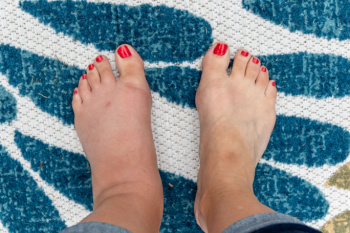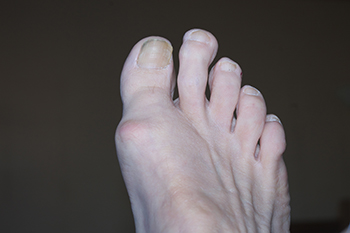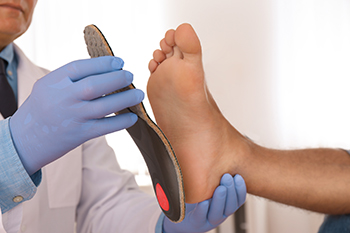Connect With Us
Blog
Items filtered by date: May 2024
Uncommon Causes of Swollen Feet

Swollen feet can stem from various unexpected sources beyond the usual suspects like injury or fluid retention. One such cause of swelling, or edema, may be your footwear. Wearing ill-fitting shoes or high heels for prolonged periods of time can impede proper circulation, leading to swelling. A lesser-known cause could be dietary habits, particularly excessive salt intake, which can cause water retention in the body, resulting as swollen feet. Certain medications, such as antidepressants or blood pressure drugs, might also induce swollen feet as a side effect. In some cases, allergies to ingredients in skincare or cosmetic products can trigger inflammation, including in the feet. Additionally, long flights or car rides, where prolonged sitting limits movement, can result in swollen feet due to decreased blood circulation. If your feet have become swollen and remain so, it is suggested that you visit a podiatrist who can help you to manage this condition.
Swollen feet can be a sign of an underlying condition. If you have any concerns, contact one of our podiatrists of Fox Valley Foot and Ankle Specialists. Our doctors can provide the care you need to keep you pain-free and on your feet.
Swollen feet are a common ailment among pregnant women and people who stand or sit for extended periods. Aging may increase the possibility of swollen feet and patients who are obese often notice when their feet are swelling too. There may be medical reasons why swollen feet occur:
- Phlebitis - A condition that causes the veins to become inflamed and can also cause leg pain.
- Liver disease - This may lead to low blood levels of albumin which is a protein. This can cause fluid in the blood to pass into the tissues and several areas of the body can become swollen.
- Heart failure - When the heart doesn’t pump properly the blood that is normally pumped back to the heart can pool in the veins of the legs causing swollen feet.
- Kidney disease - One of the main functions of the kidneys is releasing excess fluid in the body. This type of condition can make it difficult for the kidneys to function properly, and as a result the feet may become swollen.
- Deep-vein thrombosis (DVT)- This is a serious condition where blood clots form in the veins of the legs. They can block the return of blood from the legs to the heart which may cause the feet to swell. It is important to be treated by a podiatrist if this condition is present.
Swollen feet can also be caused by bone and tendon conditions, including fractures, arthritis, and tendinitis. Additionally, there may be skin and toenail conditions and an infection may cause the feet to swell. Patients who take medicine to treat high blood pressure may be prone to getting swollen feet.
Many patients elevate their feet to help relieve the swelling and this is generally a temporary remedy. When a podiatrist is consulted the reason behind the swelling can be uncovered and subsequently treated.
If you have any questions please feel free to contact our office located in Naperville, IL . We offer the newest diagnostic tools and technology to treat your foot and ankle needs.
Are You Suffering From Ingrown Toenails?
The Versatility of Custom Orthotics

Custom orthotics, often associated with runners or athletes, offer benefits beyond the realm of sports. These specialized shoe inserts are designed to address imbalances in foot structure, which can significantly impact posture and overall body alignment. Even a minor imbalance can lead to problems throughout the body. Orthotics may be beneficial if you notice uneven wear on the soles of your shoes or have frequent ankle sprains. Chronic pain in the heels, misaligned toes, or abnormal foot positioning during walking are other reasons that orthotics may be needed. By providing support and stability, orthotics help distribute weight more evenly across the foot, reducing strain on muscles and joints. They can correct biomechanical issues, improve gait efficiency, and alleviate discomfort associated with various conditions. Whether you are an athlete or someone seeking relief from everyday discomfort, custom orthotics offer a simple yet effective solution to enhance foot function and promote overall well-being. If you are interested in learning more about how custom-made orthotics can help you, it is suggested that you consult a podiatrist.
If you are having discomfort in your feet and would like to try orthotics, contact one of our podiatrists from Fox Valley Foot and Ankle Specialists. Our doctors can provide the care you need to keep you pain-free and on your feet.
What Are Orthotics?
Orthotics are inserts you can place into your shoes to help with a variety of foot problems such as flat feet or foot pain. Orthotics provide relief and comfort for minor foot and heel pain but can’t correct serious biomechanical problems in your feet.
Over-the-Counter Inserts
Orthotics come in a wide variety of over-the-counter inserts that are used to treat foot pain, heel pain, and minor problems. For example, arch supports can be inserted into your shoes to help correct overarched or flat feet, while gel insoles are often used because they provide comfort and relief from foot and heel pain by alleviating pressure.
Prescription Orthotics
If over-the-counter inserts don’t work for you or if you have a more severe foot concern, it is possible to have your podiatrist prescribe custom orthotics. These high-quality inserts are designed to treat problems such as abnormal motion, plantar fasciitis, and severe forms of heel pain. They can even be used to help patients suffering from diabetes by treating foot ulcers and painful calluses and are usually molded to your feet individually, which allows them to provide full support and comfort.
If you are experiencing minor to severe foot or heel pain, it’s recommended to speak with your podiatrist about the possibilities of using orthotics. A podiatrist can determine which type of orthotic is right for you and allow you to take the first steps towards being pain-free.
If you have any questions please contact our office located in Naperville, IL . We offer the newest diagnostic and treatment technologies for all your foot and ankle needs.
Custom Orthotics Seasonal - Any Season

Rain or shine, snow or sleet, Custom Orthotics have your feet covered! As the seasons change, ensure your steps remain comfortable and supported. Custom Orthotics adapt to your footwear, from summer sandals to winter boots, providing consistent relief and alignment. Don't let the changing weather dictate your foot comfort. Step confidently year-round and experience the difference with Custom Orthotics. Call today for more information.
Problems Caused by a Longer Second Toe

If your second toe seems to protrude a bit farther than your big toe, you might have what is commonly known as Morton’s toe. This condition may seem like a minor foot quirk, but it can lead to some uncomfortable problems. One of the primary issues associated with Morton’s toe is the increased likelihood of developing calluses on the sole of your foot and experiencing various types of foot pain. This happens because the longer second toe can alter how weight is distributed across your foot, putting extra pressure on certain areas. The condition is named after Dudley Joy Morton, who first described it in the 1930s, and is unrelated to Morton’s neuroma. In some cases, Morton’s toe can lead to more severe foot conditions, such as hammer toe or bunions, especially if your footwear does not accommodate your foot shape properly. If you are experiencing discomfort or noticing changes in your foot due to Morton’s toe, it is essential to seek help from a podiatrist who can offer various conservative treatments. These can include shoe modifications, custom orthotics, exercises, and medication, all of which can help to alleviate pain and prevent further complications. If you have Morton’s toe or are experiencing foot pain, it is suggested that you schedule an appointment with a podiatrist.
If you have any concerns about your feet, contact one of our podiatrists from Fox Valley Foot and Ankle Specialists. Our doctors can provide the care you need to keep you pain-free and on your feet.
Biomechanics in Podiatry
Podiatric biomechanics is a particular sector of specialty podiatry with licensed practitioners who are trained to diagnose and treat conditions affecting the foot, ankle and lower leg. Biomechanics deals with the forces that act against the body, causing an interference with the biological structures. It focuses on the movement of the ankle, the foot and the forces that interact with them.
A History of Biomechanics
- Biomechanics dates back to the BC era in Egypt where evidence of professional foot care has been recorded.
- In 1974, biomechanics gained a higher profile from the studies of Merton Root, who claimed that by changing or controlling the forces between the ankle and the foot, corrections or conditions could be implemented to gain strength and coordination in the area.
Modern technological improvements are based on past theories and therapeutic processes that provide a better understanding of podiatric concepts for biomechanics. Computers can provide accurate information about the forces and patterns of the feet and lower legs.
Understanding biomechanics of the feet can help improve and eliminate pain, stopping further stress to the foot.
If you have any questions please feel free to contact our office located in Naperville, IL . We offer the newest diagnostic and treatment technologies for all your foot and ankle needs.
Special Needs Population and Custom Orthotics

For individuals with special needs, foot and ankle conditions are often more prevalent, necessitating careful consideration when prescribing custom orthotics. Conditions like plantar fasciitis, medial tibial stress syndrome, hallux limitus, and rigidus are commonly observed, especially among those with Down syndrome or Fragile X syndrome. When designing orthotics for special needs patients, modifications may be required to accommodate unique foot shapes and biomechanical issues. Attention to materials and shoe compatibility is important to ensure optimal support and comfort. A biomechanical examination is essential to assess gait patterns and identify specific needs. Podiatrists specialize in working with such patients, providing tailored orthotic solutions, and collaborating with caregivers to address individual requirements effectively. If you have special needs and have foot issues, or if you are caring for such an individual, it is suggested that you schedule an appointment with a podiatrist who can help enhance their mobility, comfort, and overall foot health.
Experience a transformative solution to heel pain and foot pain through the personalized benefits of custom orthotics and shoe inserts. If you’re grappling with the persistent agony of plantar fasciitis, these customized inserts are designed to alleviate the strain on the plantar fascia, providing targeted relief. Engineered to adapt to your unique foot anatomy, custom orthotics tackle not only plantar fasciitis but also general foot and heel pain, offering unparalleled support and comfort. Don’t let every step be a reminder of discomfort; step into a world of tailored well-being. Say farewell to the limitations imposed by heel pain and embrace the freedom of pain-free mobility. Invest in your foot health and redefine your daily stride with the transformative power of custom orthotics and shoe inserts, ensuring each step is a step towards lasting comfort.
If you have any questions please contact our office located in Naperville, IL . We offer the newest diagnostic and treatment technologies for all your foot and ankle needs.
Foot Pain During Pregnancy
 Pregnancy often brings about foot pain and lower limb changes due to increased weight and altered body mechanics as the baby grows. These changes can lead to swelling, varicose veins, and changes in foot structure. A common issue is flattened arches, which may cause pain and discomfort. Supportive and comfortable footwear, avoiding standing for prolonged periods, and elevating feet to reduce swelling are suggested to alleviate symptoms. Compression stockings can also help manage swelling and prevent varicose veins. Gentle exercise, like walking or swimming, can improve circulation and reduce leg cramps. Consulting with a podiatrist, or foot doctor, is important to get targeted treatment advice. Podiatrists can also prescribe orthotics or specific exercises to strengthen the feet and legs during pregnancy. If you are pregnant and struggling with foot pain, it is suggested that you consult a podiatrist for treatment options.
Pregnancy often brings about foot pain and lower limb changes due to increased weight and altered body mechanics as the baby grows. These changes can lead to swelling, varicose veins, and changes in foot structure. A common issue is flattened arches, which may cause pain and discomfort. Supportive and comfortable footwear, avoiding standing for prolonged periods, and elevating feet to reduce swelling are suggested to alleviate symptoms. Compression stockings can also help manage swelling and prevent varicose veins. Gentle exercise, like walking or swimming, can improve circulation and reduce leg cramps. Consulting with a podiatrist, or foot doctor, is important to get targeted treatment advice. Podiatrists can also prescribe orthotics or specific exercises to strengthen the feet and legs during pregnancy. If you are pregnant and struggling with foot pain, it is suggested that you consult a podiatrist for treatment options.
Pregnant women with swollen feet can be treated with a variety of different methods that are readily available. For more information about other cures for swollen feet during pregnancy, consult with one of our podiatrists from Fox Valley Foot and Ankle Specialists. Our doctors will attend to all of your foot and ankle needs.
What Foot Problems Can Arise During Pregnancy?
One problem that can occur is overpronation, which occurs when the arch of the foot flattens and tends to roll inward. This can cause pain and discomfort in your heels while you’re walking or even just standing up, trying to support your baby.
Another problem is edema, or swelling in the extremities. This often affects the feet during pregnancy but tends to occur in the later stages.
How Can I Keep My Feet Healthy During Pregnancy?
- Wearing orthotics can provide extra support for the feet and help distribute weight evenly
- Minimize the amount of time spent walking barefoot
- Wear shoes with good arch support
- Wear shoes that allow for good circulation to the feet
- Elevate feet if you experience swelling
- Massage your feet
- Get regular, light exercise, such as walking, to promote blood circulation to the feet
If you have any questions please feel free to contact our office located in Naperville, IL . We offer the newest diagnostic and treatment technologies for all your foot and ankle needs.
